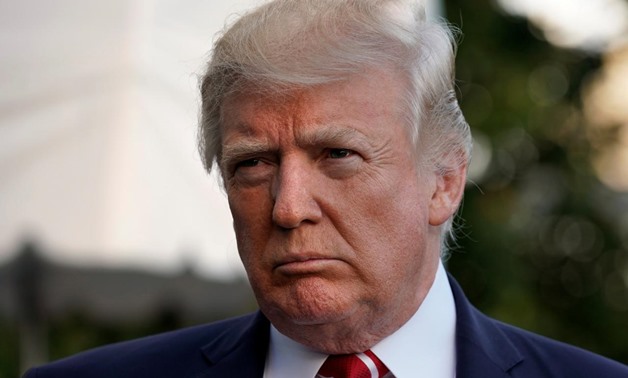
U.S. President Donald Trump - File photo
WASHINGTON - 13 October 2017: U.S. President Donald Trump will strike a blow against the 2015 Iran nuclear agreement on Friday in defiance of other world powers, choosing not to certify that Tehran is complying with the deal in a major reversal of U.S. policy.
Trump is to make the announcement in a speech at 12:45 p.m. EDT (1645 GMT) that will detail a more confrontational approach to Iran over its nuclear and ballistic missile programs and its support for extremist groups in the Middle East, U.S. Secretary of State Rex Tillerson told reporters.
"It is time for the entire world to join us in demanding that Iran's government end its pursuit of death and destruction," Trump said in a White House statement that flagged key elements of the strategy.
While Trump will not pull the United States out of the agreement, aimed at preventing Iran from developing a nuclear bomb, he will give the U.S. Congress 60 days to decide whether to reimpose economic sanctions on Tehran that were lifted under the pact.
That would increase tension with Iran as well as put Washington at odds with other signatories of the accord such as Britain, France, Germany, Russia, China and the European Union.
If Congress reimposes the sanctions, the United States would in effect be in violation of the terms of the nuclear deal and it would likely fall apart. If lawmakers do nothing, the deal remains in place.
Trump's harder line on Iran is his latest effort to pursue an "America First" approach to international agreements, such as withdrawing from the Paris climate accord and the Trans-Pacific Partnership trade talks.
Trump will also give the U.S. Treasury Department broad authority to impose economic sanctions against people in the Islamic Revolutionary Guards Corps or entities owned by it in response to what Washington calls its efforts to destabilize and undermine Iran's opponents in the Middle East.
Trump will attempt to persuade the U.S. Congress to impose "trigger points" that were not in the original nuclear deal that would require U.S. sanctions to be imposed if Iran crossed them.
Tillerson acknowledged the latest strategy may not work.
"What we are laying out here is this is the pathway we think provides us the best platform from which to attempt to fix this deal," he said. "We may be unsuccessful. We may not be able to fix it. And if we’re not then we may end up out of the deal."
EUROPEANS WORRIED
The Republican president has been under strong pressure from European leaders and U.S. lawmakers to swallow his concerns and certify the nuclear deal because international inspectors say Iran is in compliance with it.
The leaders of Britain and France have personally appealed to Trump to re-certify the nuclear accord for the sake of allied unity.
Germany's government pledged on Friday to work for continued unity if Trump de-certified the deal as Berlin remain convinced the agreement was an important tool to prevent Iran developing nuclear weapons.
Foreign Minister Sigmar Gabriel underlined German views in a telephone call with U.S. Secretary of State Rex Tillerson on Thursday.
Russian President Vladimir Putin's spokesman, Dmitry Peskov, said that if the United States ditched the nuclear pact, "this will damage the atmosphere of predictability, security, stability and non-proliferation in the entire world".
Israel, Iran's arch-adversary in the Middle East, welcomed Trump's anticipated announcement but voiced doubt that the tougher tack by Washington could turn around the Islamic Republic.
Trump, who took office in January, had reluctantly certified the agreement twice before but has repeatedly blasted it as "the worst deal ever" and an embarrassment. It was negotiated under his predecessor former President Barack Obama.
Tillerson said that rather than reimposing sanctions, Trump wants the Republican-controlled Congress to fix what he considers flaws in the agreement.
Lawmakers would do this by amending the Iran Nuclear Agreement Review Act law to strengthen nuclear inspections, cover Iran's ballistic missile program and eliminate the deal's "sunset clause" under which some of the restrictions on Iran's nuclear program expire over time.
"The deal is designed to prevent a nuclear weapon. It shouldn't have a sunset clause at all," said a senior administration official.
The ultimate goal is for a new agreement to be negotiated with Iran to cover its ballistic missile program and other U.S. concerns, Tillerson said.
He said he had discussed with Iranian Foreign Minister Mohammad Javad Zarif at the United Nations in September the possibility of a second agreement alongside the 2015 accord.
"I indicated this to Foreign Minister Zarif when we saw each other on the margins of the U.N. I don't want to suggest to you that we give that a high chance of success but there is an openness to talk about it," Tillerson said.

Comments
Leave a Comment